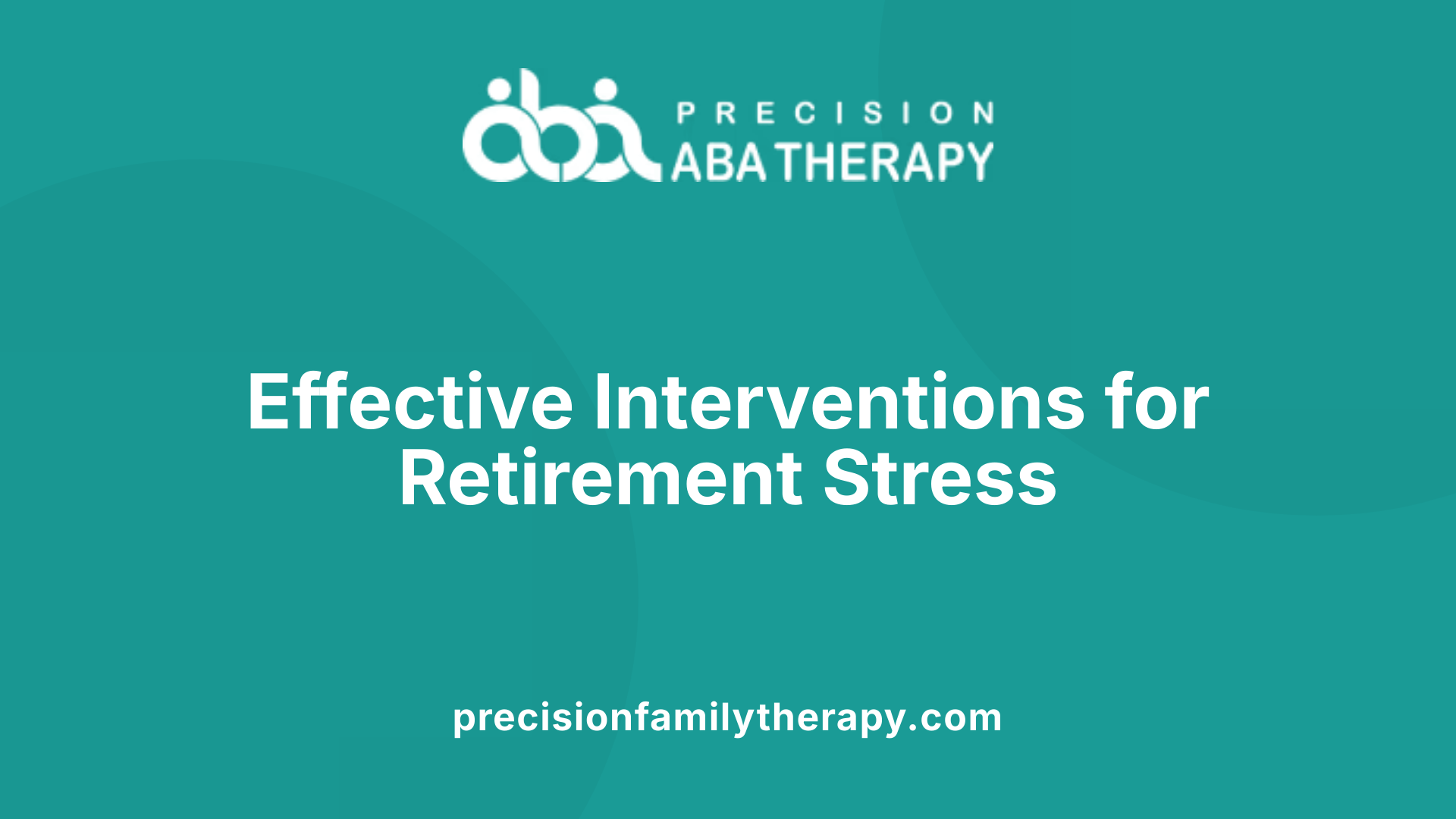Introduction to Retirement Transitions and Therapy
Retirement marks a significant transition not only for individuals but also for their families, bringing a mix of emotions and changes that can be challenging to navigate. As financial concerns, shifting identities, and altered family dynamics come into play, therapy can provide crucial support, helping families to smoothly transition into this new life stage. By fostering communication, addressing emotional turmoil, and guiding individuals through the psychological adjustments required, therapy plays an essential role in enhancing well-being during retirement.
The Emotional Landscape of Retirement

What are the emotional and psychological challenges associated with retirement?
Retirement can trigger a range of emotional and psychological challenges for many individuals. As they transition away from the workforce, feelings of sadness and loss of identity are common. The initial excitement often referred to as the 'honeymoon phase', can quickly turn into disillusionment. This is due, in part, to the diminished structure that work provided, leading to a sense of purposelessness.
Loneliness is another significant concern. Many retirees report feelings of isolation, especially when social routines change or diminish. Stats indicate that nearly one in three retirees may experience depression as they adjust to this new phase. Financial worries further complicate matters, adding a layer of anxiety that can impact mental health.
Here are some key emotional challenges faced during retirement:
| Challenge | Description | Potential Solutions |
|---|---|---|
| Loss of Identity | Leaving the workforce can lead to feelings of being lost without a defined role. | Therapy to explore new interests. |
| Purposefulness | Many retirees struggle to find new meaning in their days. | Engaging in volunteering or hobbies. |
| Loneliness | Social connections may weaken, leading to feelings of isolation. | Joining social groups or classes. |
| Financial Anxiety | Concerns about money management post-retirement can lead to stress. | Counseling for financial planning. |
Engaging in meaningful activities, whether through volunteering or rediscovering old hobbies, can help retirees foster a renewed sense of purpose. This not only improves their emotional well-being but also reinvigorates social connections that are often essential during this transition.
The Therapeutic Benefits for Families

Role of therapy in family transitions
Counseling plays a crucial role in helping families navigate the many changes that come with retirement. As individuals transition into this new life stage, they often encounter emotional upheavals such as loss of routine, identity shifts, and altered family dynamics. Therapy provides a supportive environment where family members can express their feelings, address conflicts, and learn effective communication strategies.
In particular, family therapy offers a space to confront the stresses associated with caregiving and redefine family roles. This collaborative approach not only assists retirees in managing their personal challenges but also encourages healthier interactions among family members.
Enhancing family dynamics
The benefits of counseling extend into enhancing the overall family dynamic. Through therapy, families can improve emotional connections and reduce isolation, fostering stronger bonds. This is vital as family members learn to adapt to life changes together, such as navigating fixed incomes or health issues.
Moreover, counseling provides practical support in financial planning and health management, equipping families with tools to face challenges collectively. By addressing fears and anxieties openly, families can transition into retirement with a renewed sense of purpose and fulfillment. Overall, therapy fosters resilience and promotes family cohesion, enriching the retirement experience for everyone involved.
Managing Family Dynamics in Retirement

How can therapy help manage family dynamics during retirement?
Therapy can play a crucial role in managing family dynamics during retirement by addressing the changes that often occur in roles and responsibilities. As retirees navigate their new lifestyle, conflicts can arise, making healthy communication even more vital.
One effective way therapy helps is through enhancing empathy and understanding among family members. Programs like family sculpting and family systems therapy focus on identifying unhealthy dynamics that may develop during transitions. By recognizing these patterns, families can work together to rectify them, which greatly improves emotional well-being.
Additionally, therapy offers a safe space for family members to explore underlying issues, establish healthy boundaries, and express their feelings. Such dialogue fosters resilience and better decision-making, strengthening the family unit as they adapt to their new situation.
The support provided during these therapeutic sessions can significantly mitigate feelings of isolation and stress, helping families cultivate a more supportive atmosphere. As retirement often brings shifts in familial relationships, therapy equips individuals with tools to navigate these changes positively, enhancing overall family health.
Effective Therapeutic Interventions

Which therapeutic interventions are effective for coping with retirement stress?
Effective therapeutic interventions for managing retirement stress encompass various approaches, most notably cognitive-behavioral therapy (CBT), mindfulness practices, and group therapy sessions. These methods focus on improving emotional health, building coping strategies, and addressing challenges like loss of identity and social isolation that retirees often face.
Cognitive-Behavioral Therapy (CBT) and Mindfulness
CBT is particularly effective in helping retirees recognize and transform negative thoughts associated with work transitions into more constructive perspectives. It teaches techniques to challenge unhelpful beliefs and develop more adaptive thought patterns.
Mindfulness practices, including meditation and breathing exercises, promote relaxation and present-moment awareness, indispensable tools for reducing anxiety and enhancing mental well-being.
Group Therapy
Group therapy offers retirees a shared space for experiences, facilitating discussions that mitigate feelings of loneliness. Engaging with others facing similar transitions helps strengthen social connections and encourages camaraderie. This shared experience can significantly alleviate stress and foster a sense of belonging.
Practical tips for embracing retirement include redefining personal identity, setting attainable goals, and actively engaging in community activities. Incorporating regular physical activity, such as yoga or walking, further assists in managing anxiety while promoting overall health.
Finally, a comprehensive retirement plan that includes financial, emotional, and social components can greatly reduce stress, providing a roadmap for navigating this significant life change.
The Role of Emotional and Social Support

Why is emotional and social support important during retirement transitions?
Emotional and social support is crucial during retirement transitions because it helps mitigate feelings of isolation, depression, and loneliness that often accompany this significant life change. Retirement marks a substantial shift in daily routines and identities, leading many individuals to feel disconnected from their previous social circles.
Support from partners and friends encourages retirees to engage in new activities, which enhances life satisfaction and overall health. The self-expansion model suggests that participating in varied social interactions can lead to improved mental well-being. Research indicates that strong social connections lead to better mental and physical health, helping retirees stave off cognitive decline and chronic illnesses.
Additionally, active social engagement fosters a sense of community and belonging. This emotional support reduces the risks associated with social isolation, which can adversely affect mental health. Engaging with peers, participating in group activities, or even volunteering can create meaningful interactions, reinforcing the importance of having a solid support network.
Combatting isolation through supportive networks
Social support networks hold immense value for retirees. They not only provide companionship but also serve as a buffer against the challenges that come with retirement. Strong relationships can enhance the quality of life by offering emotional validation and understanding during times of transition.
Here are a few ways to combat isolation and boost emotional well-being:
- Engagement in community activities: Joining local clubs or classes can provide new friendships and interests.
- Volunteering opportunities: Helping others promotes a sense of purpose and connection.
- Maintaining family ties: Staying involved with children and grandchildren strengthens family bonds and enhances feelings of belonging.
In summary, nurturing emotional and social support networks is vital for retirees. These connections significantly enhance overall satisfaction, helping individuals navigate the emotional complexities of retirement while maintaining their quality of life.
Research Perspectives on Therapy's Impact
What do research findings say about the impact of therapy on well-being during retirement?
Research findings underscore the positive influence of therapy on well-being during retirement. Therapy enhances life satisfaction and overall mental health among retirees, addressing various emotional challenges commonly faced during this transition.
Key Factors Influencing Well-Being
Several key factors contribute to retirees' well-being:
- Social Networks: A strong support system can mitigate feelings of isolation and enhance emotional resilience.
- Financial Stability: Financial resources are critical; studies indicate that men experience significant benefits from financial preparedness, while women often have better outcomes linked to their social connections.
- Personal Goals: A defined sense of purpose and personal goals can guide retirees and enrich their experience post-retirement. Engaging in meaningful activities is essential for sustaining mental health and life satisfaction.
Effectiveness of Therapy Approaches
Specific therapies, particularly cognitive behavioral therapy (CBT) and group interventions, prove effective for addressing mental health conditions in older adults. These therapies can help manage feelings of anxiety and depression that frequently arise during retirement. Furthermore, proactive engagement in social activities associated with fulfilling retirement plans was shown to correlate strongly with improved mental health outcomes.
Overall, the research suggests that therapeutic support is vital for promoting well-being and assisting retirees in embracing their new lifestyles with increased satisfaction.
Preparation for Retirement: Emotional Adjustments
How can families prepare for emotional adjustments related to retirement?
Preparing emotionally for retirement involves proactive steps families can take to support the transitioning retiree. Open communication is essential; families should engage in discussions that address expectations and potential feelings surrounding this major life change.
Creating a vision for post-retirement life can help individuals focus on future possibilities. Families can brainstorm various activities, hobbies, and volunteering opportunities that could infuse a sense of purpose into retirement.
It's equally important to develop a support network. Encouraging connections with friends, family, and former colleagues can significantly reduce feelings of isolation and loneliness. Reaching out for social activities, be it through community events, clubs, or informal gatherings, fosters a sense of belonging.
In addition, integrating physical activity and relaxation techniques can greatly contribute to mental well-being, alleviating stress and anxiety that may arise during this transition.
Finally, families might consider professional guidance. Seeking the expertise of a counselor can provide valuable tools to navigate the emotional challenges of retirement, ensuring everyone involved communicates openly about their feelings throughout this significant transitional phase.
Concluding Thoughts on Therapy in Retirement
As families embark on the retirement journey, the role of therapy becomes increasingly significant in fostering an environment of understanding, adjustment, and growth. Through facilitating open communication, promoting resilience, and addressing the multifaceted challenges faced during retirement, therapy not only enhances the individual's experience but fortifies the entire family unit. By preparing emotionally and leveraging therapeutic guidance, families can embrace retirement as a period of renewed purpose and satisfaction—ensuring that this life transition, while challenging, opens new doors to fulfillment and joy.
References
- How Senior Counseling Can Help Navigate Life Transitions
- Counseling for Seniors and Those Nearing Retirement: Supporting ...
- Navigating Life Transitions: Support Through Life Transition ...
- The Impact of Retirement on Families | Psychology Today
- The Role of Counseling in Navigating Life Transitions
- Interventions across the Retirement Transition for Improving Well ...
- Interventions that support major life transitions in older adulthood
- How retirement counselling can help the elderly to cope with changes
- Adjusting to Retirement: Handling Depression, Stress, and Anxiety




